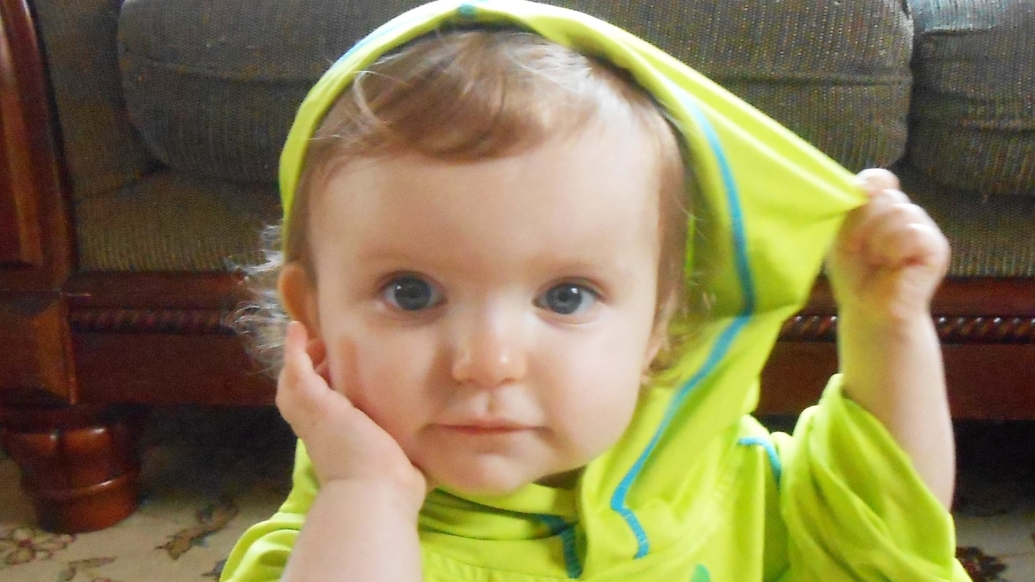A treatment usually used for adults has helped keep Nora stable since her diagnosis of stage 4 metastatic melanoma as a newborn.
7:00 AM
Author |

Amanda Hosier is used to the bewildered reactions when she tells people about her daughter's disease.
MORE FROM MICHIGAN: Sign up for our weekly newsletter
Nora is 2 years old — and she has melanoma.
"I have to tell them it has nothing to do with the sun," Hosier says. "My baby has never been out in the sun. I never lay out in the sun.
"Nora was born with this cancer."
Doctors think a mutation spontaneously occurred in utero, causing undetected melanoma cells to grow during development.
"We spoke with physicians all over the country to find out if anyone had ever seen anything like this," says Angela Weyand, M.D., a pediatric oncologist at University of Michigan C.S. Mott Children's Hospital, who has seen Nora since birth. "We could not identify a single other case exactly like Nora's."
A stunning diagnosis
Hosier says there were no signs anything was wrong during pregnancy. Nora was girl No. 4 for Hosier and husband, Wesley. And just as with daughters Emma, 12, Audrey, 8, and Lila, 4, everything seemed "perfect" before Nora was born in March 2015.
SEE ALSO: Identical 5-Year-Old Twins with Identical Cancers
But within a few hours of her birth at a local hospital near the family's home in Huntington, Indiana, her parents and doctors noticed a bluish, dime-sized bump on her scalp. The doctor guessed it may have had something to do with trauma during birth or a type of mole known as a blue nevus.
When it didn't go away, physicians recommended surgery to remove it.
At 7 weeks old, Nora underwent a procedure to remove the bump at a Fort Wayne hospital. But tissue samples indicated the bump was more than a trauma mark or mole — it was a malignant tumor.
An MRI, a PET scan and more testing by Mott Children's cancer teams showed that the cancer cells were not just in her scalp. They had spread through her liver, lungs and lymph nodes and even caused a fracture in her tibia, the main leg bone.
The ultimate diagnosis was shocking: 14-week-old Nora had stage 4 metastatic melanoma.
"We were devastated. Our reaction was just, 'How could this even be happening? Melanoma in a baby? Are you sure?'" Hosier recalls.
"We just couldn't process it. Still, I have such a hard time wrapping my head around the fact that my baby was born with cancer. You are overwhelmed with such a feeling of complete helplessness."

'No protocol'
Doctors were stunned as well. Mott teams treat skin cancer in children, but a newborn case is extremely rare.
"People most often think of melanoma as a skin cancer caused by sun exposure or a pre-existing mole. This is not the case with Nora. For her, it started internally," Weyand says. Melanoma unassociated with sun exposure can occur in adults as well, she notes.
"There is no protocol for treating this type of cancer in a baby," Weyand says. "The treatment we thought had the best chance of helping Nora had only been proven to work in adults, not children. But it was the best option available."
Because she was so small, Nora needed a Broviac, a central venous catheter that was placed into her vein during a surgical procedure. It allows doctors to provide intravenous medicine and other fluids, as well as to draw blood.
SEE ALSO: 4 Miraculous 'Little Victors,' One First-Grade Classroom
Since Nora's diagnosis, her family has been making the 340-mile round-trip trek almost every two weeks for treatment. At Mott, she is treated with a tiny, scaled-down dose of an immunotherapy cancer drug that has had promising outcomes for the same type of cancer in adults. The inhibitor releases a brake on the immune system, empowering it to attack cancer cells more aggressively.
The treatment is similar to what successfully helped Jimmy Carter, at age 91, fight an internal form of melanoma that was discovered in his liver and spread to his brain.
Although the medication hasn't killed off the cancer itself, it has kept Nora stable and prevented the disease from progressing.
"If we saw a case like Nora's 10 years ago, there would have been very few options," Weyand says. "Great advances in research have led to new treatments over the past decade, including the medication we are using to treat Nora."
Hope for progress
The Hosiers hope Nora's story inspires more support for pediatric cancer research — which makes up just 4 percent of federal research dollars.
"It's disheartening to see how little of the national budget is dedicated to childhood cancer. These babies are our future," Hosier says.
"These immunotherapy drugs are definitely saving lives, but it has taken years to get to this point. So far, Nora is responding well without any of the classic chemotherapy side effects you hear about, like nausea, fatigue or losing hair. It's a blessing."
Any progress in research brings hopes for families like hers, Hosier says.
In April, the curly haired toddler celebrated her second birthday with cake, ice cream and opening 100 cards from around the world — from supporters as far as England and Australia who have been following the family's Love for Nora page online. Her favorite things today include painting, books and playing with her sisters.
"Honestly, when we found out, I thought my baby was going to die," Hosier says. "We weren't sure we'd even get to see her turn 1, and here we are celebrating her second birthday. It's amazing.
"We don't know what's going to happen in the future, but right now Nora is stable and you would never know she's sick. She doesn't know what we know — which is good. She's the most joyful, playful little girl, and we are just enjoying all the little moments. She's such an inspiration."
Learn more about supporting Michigan research to fight and cure rare childhood cancers.

Explore a variety of health care news & stories by visiting the Health Lab home page for more articles.

Department of Communication at Michigan Medicine
Want top health & research news weekly? Sign up for Health Lab’s newsletters today!





